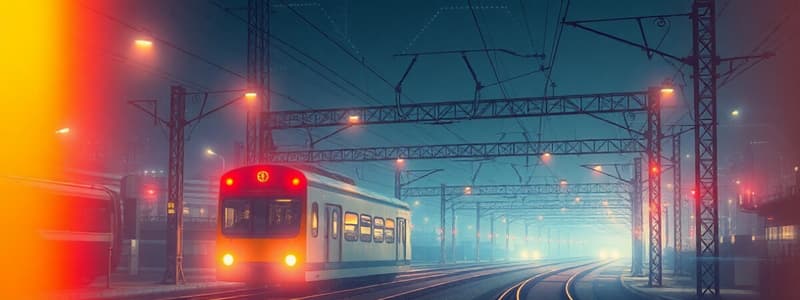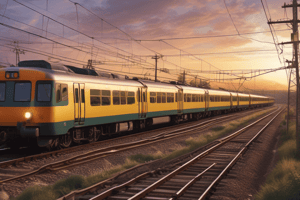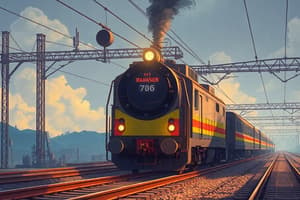Podcast
Questions and Answers
Who is responsible for the overall incharge of the S&T organization of the Division when there are multiple SG/JAG officers?
Who is responsible for the overall incharge of the S&T organization of the Division when there are multiple SG/JAG officers?
- Divisional Railway Manager
- PCSTE
- Sr.DSTE/Co-ordination (correct)
- DSTE/ADSTE
What is one of the essential duties of Sr.Section Engineer/Junior Engineer (Tele)?
What is one of the essential duties of Sr.Section Engineer/Junior Engineer (Tele)?
- Training new employees on policies
- Supervising passenger services directly
- Implementing administrative policies
- Regular inspection and efficient maintenance of telecom equipment (correct)
Which telecom systems are excluded from the responsibilities of the SSE/JE (Tele)?
Which telecom systems are excluded from the responsibilities of the SSE/JE (Tele)?
- Internal Communication Systems (correct)
- Video Surveillance Systems
- Train Radio Communication
- Optical Fibre & systems
What does the Sr.Section Engineer/JE (Tele) NOT perform in their duties?
What does the Sr.Section Engineer/JE (Tele) NOT perform in their duties?
Who do the SSE/JE (Tele) report to for the maintenance of telecommunication equipment?
Who do the SSE/JE (Tele) report to for the maintenance of telecommunication equipment?
Which aspect of telecommunications is NOT highlighted as a responsibility under the SSE/JE (Tele)?
Which aspect of telecommunications is NOT highlighted as a responsibility under the SSE/JE (Tele)?
What role does the Sr.Section Engineer/Junior Engineer (Tele) primarily play in maintaining power supply systems?
What role does the Sr.Section Engineer/Junior Engineer (Tele) primarily play in maintaining power supply systems?
Which of the following is NOT included in the telecommunications systems that SSE/JE (Tele) must maintain?
Which of the following is NOT included in the telecommunications systems that SSE/JE (Tele) must maintain?
What is the maximum distance between emergency sockets provided along the route?
What is the maximum distance between emergency sockets provided along the route?
Which equipment is NOT typically used for emergency wireless communication?
Which equipment is NOT typically used for emergency wireless communication?
What type of control phone should station masters use to communicate with section controllers?
What type of control phone should station masters use to communicate with section controllers?
What is the primary purpose of emergency control communication?
What is the primary purpose of emergency control communication?
What type of buttons are required for selective calling by section controllers?
What type of buttons are required for selective calling by section controllers?
What is the maximum prescriptive time associated with implementing protective works?
What is the maximum prescriptive time associated with implementing protective works?
What condition must be met before energization can occur?
What condition must be met before energization can occur?
Who is responsible for monitoring cases below 33 KV?
Who is responsible for monitoring cases below 33 KV?
Which member of the Central PTCC is from the Ministry of Communication?
Which member of the Central PTCC is from the Ministry of Communication?
Which entity is responsible for examining badly delayed cases of 33 KV D/C and above?
Which entity is responsible for examining badly delayed cases of 33 KV D/C and above?
Who holds the chairman position in the Central PTCC?
Who holds the chairman position in the Central PTCC?
What is a prerequisite for protective works to be undertaken by other agencies?
What is a prerequisite for protective works to be undertaken by other agencies?
What role does the representative from the Army Headquarters have within the Central PTCC?
What role does the representative from the Army Headquarters have within the Central PTCC?
What may the authorities quote when discussing the re-engineering timeframes?
What may the authorities quote when discussing the re-engineering timeframes?
What must be undertaken to ensure the information on delayed cases is reviewed?
What must be undertaken to ensure the information on delayed cases is reviewed?
What is the primary objective of the Power and Telecommunication Co-ordination Committee (PTCC)?
What is the primary objective of the Power and Telecommunication Co-ordination Committee (PTCC)?
In what year was the PTCC established by the Government of India?
In what year was the PTCC established by the Government of India?
What type of clearance does the PTCC provide before the energization of new power lines?
What type of clearance does the PTCC provide before the energization of new power lines?
Which of the following is NOT a function of the PTCC?
Which of the following is NOT a function of the PTCC?
What composition is found in the Central Standing Committee related to the PTCC?
What composition is found in the Central Standing Committee related to the PTCC?
Which committee deals with unresolved cases from the central PTCC?
Which committee deals with unresolved cases from the central PTCC?
What type of transportation is required for handling cable breakdowns in telecommunications?
What type of transportation is required for handling cable breakdowns in telecommunications?
Which power line voltage levels require PTCC clearance before energization?
Which power line voltage levels require PTCC clearance before energization?
What type of materials and tools should be available in the emergency gang vehicle for cable jointing?
What type of materials and tools should be available in the emergency gang vehicle for cable jointing?
What aspect does the PTCC review according to technological advancements?
What aspect does the PTCC review according to technological advancements?
Who serves as the chairman of the committee at the state level?
Who serves as the chairman of the committee at the state level?
What is one of the responsibilities of the WIRELESS PLANNING & COORDINATION (WPC) Wing?
What is one of the responsibilities of the WIRELESS PLANNING & COORDINATION (WPC) Wing?
Which of the following is NOT a member of the committee at the state level?
Which of the following is NOT a member of the committee at the state level?
In which year was the WIRELESS PLANNING & COORDINATION (WPC) Wing created?
In which year was the WIRELESS PLANNING & COORDINATION (WPC) Wing created?
Who acts as the Secretary for PTCC matters in the Telecom Circle?
Who acts as the Secretary for PTCC matters in the Telecom Circle?
Which entity oversees the licensing aspect for wireless users in the country?
Which entity oversees the licensing aspect for wireless users in the country?
What role does the Chief Engineer (Transmission) of the concerned SEBs have in the state-level committee?
What role does the Chief Engineer (Transmission) of the concerned SEBs have in the state-level committee?
Which role in the committee is responsible for co-ordination within the Power Utility?
Which role in the committee is responsible for co-ordination within the Power Utility?
Which of the following represents the national radio regulatory authority?
Which of the following represents the national radio regulatory authority?
What is the function of the additional members from the Power Sector in the committee?
What is the function of the additional members from the Power Sector in the committee?
Flashcards are hidden until you start studying
Study Notes
Divisional Signal & Telecom Engineer (DSTE)
- Oversees signal and telecommunication systems within the division
- Reports to the Divisional Railway Manager for administration and PCSTE for technical matters
- If multiple SG/JAG officers exist, the senior one acts as Sr.DSTE/Co-ordination and is responsible for the division's S&T organization.
- Assisted by other S&T officers (SG/JAG/SS/JS), with duties distributed based on job description and authority.
Telecommunication Systems
- Divided into sections, each maintained by Sr.Section Engineer(Telecom)/Junior Engineer(Telecom)
- Each SSE/JE is responsible to the Sr.Divisional Signal & Telecom Engineer (through DSTE/ADSTE) for maintenance and installation of assigned telecommunication equipment.
Duties of Sr. Section Engineer/JE (Tele)
- Regular inspection and maintenance of telecommunication equipment and systems
- This includes IP/MPLS networks, telephone exchanges, optical fiber & systems, telecom cables, wireless communication, passenger amenities (train/coach indicator boards, passenger information systems, public address system, etc.)
- Also encompasses data communication, train radio communication, Wi-Fi, video surveillance, video conferencing, new systems, power supply, and earthing of all telecom equipment.
- Execution of alterations and installations of new telecommunication equipment
- Periodical tests with BSNL/RailTel/other Telecom service providers
- Maintenance of stores and establishment matters
SSE(Tele) Staff
- Assisted by JEs, Technicians, and Helpers/Tele for maintenance
- JEs can work as sub-sectional leads
- Staff strength is determined by workload and local conditions
- Breakdown vehicles with cable jointing materials, tools, and testing equipment are provided for underground cables and optical fiber maintenance.
Power and Telecommunication Co-ordination Committee (PTCC)
- Established in 1949 to ensure safety of telecommunication equipment and personnel working near power transmission lines
- Responsible for route approval of new power lines
- Issues guidelines and manuals for proposal preparation
- Norms are reviewed and updated to reflect technological advancements and safety standards
- Clearance from PTCC is required before energizing new power lines of 11KV and above, obtained after approval from Railway/Telecom entities.
PTCC Committees
- Central Standing Committee: Two representatives from DOT and two from CEA, established to address re-engineering cases.
- High Level Committee: Secretaries/Board members from Power and Telecommunication sectors, handling cases with no central PTCC consensus.
- State Level PTCC Committees: Handle monitoring and review of cases below 33 KV.
- Standing Sub-committee: Examines delayed cases of 33 KV DC and above.
PTCC Composition
- Central PTCC:
- Chairman: Chief Engineer (LD & T), Central Electricity Authority
- Members: Chief General Manager of T&D Circle, Director (PTCC) & Secretary (Power) of Central Electricity Authority, Deputy General Manger of T&D Circle, Secretary (Telecom) of BSNL, Member (Railway Board), Jt.DDG (ML) of Ministry of Communication, Chairman/Co-Chairman of SLPTCC, Director (GP) of Ministry of Communication, representative of Dept. of Power, a representative from Army Headquarters, DDG(NE), TEC of BSNL, DET (PTCC) of T&D Circle
- State Level PTCC:
- Chairman: GM (Telecom) of Telecom Circle, BSNL
- Secretary: DGM (Telecom) dealing with PTCC matters (Telecom Sector), SE/DGM dealing with PTCC matters (Power Sector)
- Members: EE of Power Utility / SDE (PTCC), Zonal SE/EE, other Power Sector representatives, Chief Electrical Inspector/representative, AGM (Plg) of BSNL, DET (PTCC) of BSNL, special BSNL invitees, DSTE of Zonal Railway, Army representative.
Wireless Planning & Coordination Wing (WPC)
- Established in 1952 by Ministry of Communications
- Acts as the national radio regulatory authority for frequency spectrum management.
Emergency Control Systems in Railway Telecommunication
- Established at selected points along track routes
- Provides communication between train crew (during emergencies), traction and permanent way staff, traction power controller, and section controller
- Emergency sockets are at 1km intervals, FP/SP/SSPs, isolators in yards, LC gates, and major bridges
- Can be replaced with other emergency communication systems (MTRC, etc.) with Railway Board approval.
Emergency Wireless Control Communication
- Includes handsets for Mobile Train Radio Communication (MTRC) in sections
- Cellular mobile communication handsets in sections
- Walkie-talkie sets where VHF communication between train and control office is provided.
Train Traffic Control System Requirements
- Selective calling options for controllers to call individual stations, groups, or all stations
- Push buttons or touch screen interface for controller to dial stations
- Direct communication between station masters and controllers with minimal dialing
- Control phone with press-to-talk switch for station masters to reduce noise.
Studying That Suits You
Use AI to generate personalized quizzes and flashcards to suit your learning preferences.




